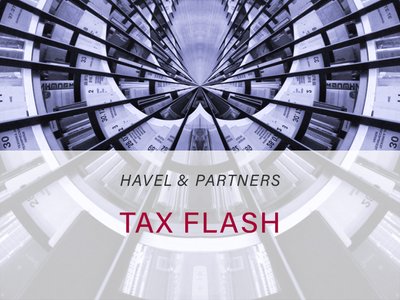Authors: David Krch, Josef Žaloudek, Martin Bureš
Dear clients and business partners,
We would like to inform you that in connection
with the spread of coronavirus COVID-19, the Government of the Czech Republic
has prepared and approved a Liberation Tax Package. The Government has adopted
a significant relaxation of sanctions that could result from non-compliance
with time-limits and other requirements under the law.
Below we are summarising the impact on individual taxes:
Corporate Income Tax (“CIT”) and Personal Income Tax (“PIT”)
- There
is a general waiver of the fine for late filing of PIT and CIT returns and
of default interest until 1 July 2020. The statutory deadline for filing
tax returns is effectively extended until 1 July 2020 without the need to prove
reasons related to coronavirus.
- Overpayments
from PIT returns filed before 1 April 2020 will normally be returned within 30
days.
- The office
hours for filing at the tax offices have been limited to Mondays and Wednesdays
from 8 am to 11 am, and some tax offices may be closed completely. We recommend
that you follow the Financial Administration website.
- Filing
of payroll returns and related tax payments must be made by 20 March 2020, as
this act is not subject to any exception. On the other hand, any penalties
associated with late filing of a Withholding Tax Statement under a special tax
rate may be waived in certain cases and under specified conditions.
- Notification
of exempt income received in 2019 must be submitted by 1 April 2020.
Social security and health insurance (“SSHI“)
- Obligations in
the area of SSHI for employers (especially submitting monthly reports or the
upcoming issuing of pension insurance records, insurance payments) are
currently without relief. However, with regard to tax measures, we expect a
similar waiver of penalties for late payments, especially in the case of
sickness/quarantine of responsible employees.
- No statements
have been issued regarding the annual Reports on the income and expenditures of
self-employed persons (OSVČ) (postponing deadlines or sanction reliefs); the
relevant information will be published. Now, the obligation to submit reports
is still valid within one month of the date on which the self-employed person
should file a tax return, i.e. no later than 4 May 2020.
Value added tax (“VAT”)
- General waiver of fines for the late submission of a control report of
CZK 1,000 incurred
between 1 March 2020 and 31 July 2020 without the need to prove the reasons
related to coronavirus;
- Individual waiver of fines for failure to submit a control report for the period from 1 March 2020 to
31 July 2020 when connection with coronavirus is proved;
- Individual waiver of fines for late submission of VAT returns on an individual request for waiver
of late payment interest (or for delaying or tax instalments) when connection
with coronavirus is proved.
Electronic Sales Record (“EET”)
- It is not legally possible to postpone the
start of the third and fourth wave of EET, however possible checks should not
penalize entrepreneurs for late recording the sales of the entities concerned
until 31 July 2020.
Waving fines upon request
- In addition to the measures described above, the
tax administrator will waive fines for late filing of tax returns, reporting or
billing for all types of taxes administered by the Ministry of Finance, if the
taxpayer individually requests a waiver of late payment interest (or for delaying or tax instalments) when
a connection with coronavirus is proved.
Therefore, we recommend you to store all
evidence proving coronavirus connections (for example documents and orders on
mandatory quarantines or medical reports of key personnel, etc.)
Miscellaneous
To summarize “standard” mechanisms – taxpayers
have the possibility to apply for:
- reduction
or cancellation of advances for PIT and CIT;
- extension
of the deadline for filing tax returns for PIT and CIT;
- delays
of tax payments or tax instalments;
- waiver of any penalties (i.e. late payment
interest).
Any application should be granted if a coronavirus
connection is proved. The charges should be waived for the applications that
involve administrative charges.
In addition to the information on the Liberation Tax Package, we summarize the possible tax implications of home office work that many employers have now negotiated with their employees. Specifically, this involves providing compensation for the costs incurred by the employee when working from home.
- The
employer must reimburse the employee for the costs (heating, cooling,
electricity, cleaning, internet connection, etc.) that are demonstrably
incurred to the employee when working from home. If no costs are incurred,
there will be no claim for compensation.
- The
employer, in cooperation with the employee, must be able to prove that the
performance provided by the employee is indeed a compensation for the costs
actually incurred. The compensation provided must be supported by expenditure receipts
and calculations proving how much of the costs incurred is related to the
performance of the employee’s work. This calculation must be economically
rational. Flat-rate costs cannot be used in the above-mentioned cases (this
is limited by the law to a flat-rate for
the maintenance of work clothes and the use of own tools or equipment
stipulated by the employer’s internal regulations or employment contract or
collective agreement).
- Providing
reimbursement of expenses incurred by an employee while working from home does
not result in employee’s taxable income (provided that the employee’s assets do
not increase). If the employee receives compensation beyond the proven
expenses, it is the employee’s income subject to income tax and SSHI payments.
- If the conditions above are met, this is a
tax-deductible expense for the employer.
Of course, the situation is developing, and
further measures can be expected, we will keep you informed. Do not hesitate to
contact us with any questions. Our experts will look at your specific situation
and together we will find a solution.
